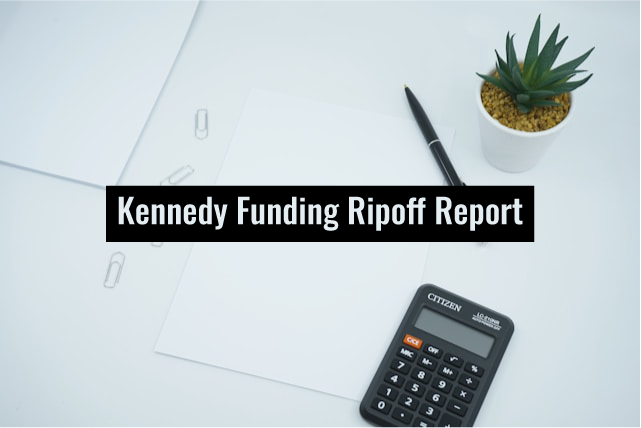The financial lending landscape is fraught with opportunities and risks, particularly in real estate, where speed and reliability are paramount. Kennedy Funding, a prominent name in bridge financing, has recently faced intense scrutiny due to the Kennedy Funding Ripoff Report, which alleges deceptive practices, hidden fees, and poor customer service. This in-depth analysis explores the validity of these claims, the company’s corrective actions, and actionable strategies for borrowers to protect their interests.
Unpacking the Controversy: Core Allegations Against Kennedy Funding
The Ripoff Report highlights several recurring grievances from borrowers:
- Undisclosed Fees: Clients report unexpected charges, such as origination fees, administrative costs, or prepayment penalties, which were not transparently outlined during initial discussions.
- Communication Breakdowns: Borrowers describe delayed responses from customer service teams, leaving them in the dark about critical loan updates or term clarifications.
- Complex Loan Agreements: Some allege that contractual language was overly technical, obscuring risks like balloon payments or variable interest rates.
Counter-Narratives: Despite these claims, Kennedy Funding retains a cohort of satisfied clients who praise its ability to fund unconventional projects—such as land development or distressed assets—that traditional banks often reject.
Kennedy Funding’s Response: Rebuilding Trust Through Reform
In response to mounting criticism, the company has implemented measures to address transparency and accountability:
- Enhanced Disclosure Practices: Loan agreements now include itemized fee schedules, with clear explanations of charges like underwriting fees (typically 1–2% of the loan amount) and exit penalties.
- 24/7 Client Portal: Borrowers can access real-time updates on application status, payment deadlines, and document submissions, reducing reliance on email or phone support.
- Third-Party Audits: Independent firms reviewed Kennedy’s processes, leading to streamlined compliance checks and staff training programs focused on ethical lending.
Official Statement:
“While we acknowledge past communication gaps, Kennedy Funding remains committed to empowering developers with timely capital. Our reforms reflect a renewed dedication to transparency, ensuring clients fully understand their obligations.”
Regulatory Investigations: Key Findings and Industry Implications
Multiple regulatory bodies, including state financial authorities and the Consumer Financial Protection Bureau (CFPB), probed the allegations:
- No Systemic Fraud Found: Investigators identified no evidence of deliberate fraud but flagged “aggressive” lending tactics, such as short repayment windows (6–12 months) for high-risk projects.
- Borrower Education Gaps: Regulators noted that many complaints stemmed from borrowers underestimating the risks of bridge loans, which often carry annualized rates of 10–15%.
- Recommendations: Authorities urged Kennedy Funding to adopt plain-language contracts and provide mandatory pre-loan counseling sessions.
Reputational Fallout: How Negative Reviews Impact Business
The Ripoff Report has had tangible repercussions:
- Client Attrition: A 2023 industry survey revealed that 22% of prospective borrowers now hesitate to engage with Kennedy Funding, opting for competitors like Lima One Capital or HardMoneyLenders.com.
- Increased Scrutiny: Regulatory bodies now require quarterly reporting on complaint resolutions, slowing loan approvals by 15–20 days.
- Rebranding Efforts: Kennedy Funding has launched a PR campaign showcasing success stories, such as a $12M loan for a mixed-use development in Texas that revived a stalled project.
Alternative Financing Solutions: A Comparative Guide
For those wary of controversy, consider these vetted alternatives:
| Lender Type | Best For | Pros | Cons |
|---|---|---|---|
| Traditional Banks | Low-risk, long-term projects | Fixed rates (4–7%), FDIC insurance | Strict credit requirements (680+ FICO) |
| Hard Money Lenders | Fix-and-flip ventures | Fast approvals (5–7 days), asset-based underwriting | High rates (8–15%), short terms (1–3 years) |
| SBA 504 Loans | Owner-occupied commercial | Low down payments (10%), long terms (20y) | Lengthy processing (60–90 days) |
| Crowdfunding | Diversified portfolios | Passive income, low minimum investments | Platform fees (1–5%), illiquid investments |
Emerging Trend: Blockchain-based real estate platforms (e.g., RealT) allow fractional ownership of properties, though regulatory frameworks remain nascent.
Self-Protection Strategies: Navigating High-Stakes Lending
- Decode the Fine Print:
- Scrutinize clauses related to default triggers, prepayment penalties, and force majeure.
- Use tools like DocuSign Analyze to flag ambiguous language.
- Demand Fee Transparency:
- Request a written breakdown of all costs, including appraisal fees (300–800), title searches (200–400), and legal fees ($1,500+).
- Verify Credibility:
- Check licenses via the NMLS Consumer Access database.
- Search litigation history on PACER or local court portals.
- Stress-Test Your Plan:
- Model worst-case scenarios (e.g., interest rate hikes, construction delays) using tools like Excel or Causal.
- Consult Independent Advisors:
- Hire a real estate attorney (250–500/hour) to review contracts.
- Engage a CFP-certified planner to assess long-term financial impacts.
The Road Ahead: Restoring Confidence in Real Estate Lending
The Kennedy Funding Ripoff Report underscores systemic challenges in private lending, where speed often conflicts with transparency. While the company’s reforms are a step forward, borrowers must remain vigilant.
Broader Industry Trends:
- AI-Driven Risk Assessment: Platforms like Blend and Roostify use machine learning to predict default risks, reducing human bias.
- Regulatory Tech (RegTech): Tools like ComplyAdvantage automate compliance checks, ensuring adherence to anti-fraud laws.
FAQs: Addressing Critical Borrower Concerns
Q: Can I renegotiate loan terms if I discover hidden fees?
A: Yes, but success depends on contractual flexibility. Document all communications and seek legal counsel to pressure lenders into revising terms.
Q: How does Kennedy Funding’s approval process work?
A: The process prioritizes collateral value over credit scores. Expect a 7–10 day timeline, with loans secured by property deeds.
Q: Are hard money lenders safer than Kennedy Funding?
A: Not necessarily. All private lenders carry risks. Vet them using the same criteria: transparency, reviews, and regulatory history.
Q: What red flags indicate a predatory lender?
A: Pressure to sign quickly, refusal to provide written terms, or demands for upfront fees before approval.
Q: How do I report suspicious lending practices?
A: File complaints with the CFPB, FTC, or your state Attorney General’s office.
Conclusion: Balancing Opportunity and Caution
The Kennedy Funding Ripoff Report serves as a cautionary tale for real estate investors. While the company has made strides toward transparency, borrowers must approach high-stakes loans with meticulous due diligence. By leveraging alternative lenders, embracing technology, and demanding clarity, developers can secure capital without compromising their financial health.
In an industry where trust is both fragile and vital, the wisest investors are those who prepare for the worst while striving for the best.








